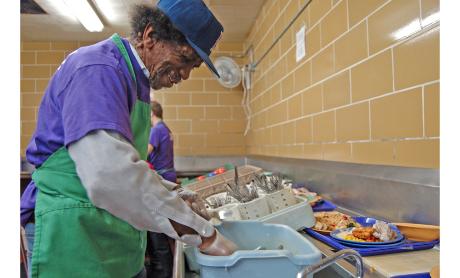 Jeromie Whalen, Collegian
Jeromie Whalen, CollegianWhen walking through the mass of students moving hastily through Franklin Dining Common to get a quick bite to eat, it becomes easy to ignore certain things. Forgetting to pick up a dropped fork, leaving a tray abandoned on a cafeteria table, or ignoring a drink accidentally spilled becomes commonplace in the mid-morning rush to class. Even skipping out on a simple thank-you to a helpful worker is easy to do. A worker, for instance, like Russell Daniels.
Considered a “problem child” by his parents, Daniels was admitted in 1958 to the Belchertown State Schools mental hospital: a place he would call home for the next 13 years of his life.
“My family just dropped me off, said goodbye and left,” said Daniels. “I didn’t have any visitors for quite a while.”
Established in 1922, the State Schools was one of many state-run facilities which intended to nurture and develop individuals with mental disabilities.
Although it was built to accommodate 1,000 people, by 1967 the State Schools housed more than 1,650 residents, some of whom were institutionalized due to their “difference” from the social norm.
Inexperienced staff members, at times outnumbered 30 to 1, were responsible for the impossible task of bathing, shaving, dressing, medicating, and performing other daily routines for every individual, in addition to cleaning and maintaining a log book of events. As a result, negligence and punishment became common tools for control.
“Instead of showering, the staff hosed down the kids with hoses,” Daniels said. “They treated the residents terrible.”
In other instances, residents were confined in a small room known as the “Dog House” for days at a time. According to Daniels, all they provided was a pillow, a blanket and a mattress. “If you got out of hand they’d take away the mattress and let you sleep on the floor,” he said.
Volunteering his services to the institution, Daniels worked tediously in the kitchen preparing meals for residents, an experience he would later draw from when becoming an employee for the University of Massachusetts’ Dining Services.
Daniels left Belchertown in 1971 and took up residence in Springfield as part of a new transitional program being implemented. “It felt real good to get out of there,” he said. “Although I never should have been there in the first place.”
A year after taking up residence in Springfield, Daniels began work at a local fast food restaurant as well as picking up odd jobs on the side.
In 1972, however, Daniels found himself again in conflict with the institution; only this time of a different nature. On August 22, Daniels was arrested on charges of fatally stabbing Klara Hass, an elderly resident of the apartment complex where he had been living for a year.
After an exhaustive seven-hour interrogation in which he was refused the right to speak to family or even a lawyer, Daniel’s was released on bail.
“[The police] didn’t treat me as a human being, that’s for sure,” he said. “It was pretty scary.”
No fingerprints, witnesses, or other evidence connected him to the crime. However, on February 23, 1973, after several months of court deliberations, Daniels was found guilty of murder. “They needed somebody to blame, and it just happened to be me,” he said.
As Daniel’s prepared to be transported for permanent confinement in Walpole Prison, support for his innocence began to emerge.
Following Daniels’ case was Benjamin Ricci, a science professor at the UMass who fought for better treatment and funding in the Belchertown State Schools after admitting his son in 1953 and observing its deteriorating condition.
Through the communal efforts of Ricci and students who believed in Daniels’ innocence, supporters demanded that Massachusetts Gov. Francis Sargent meet with them on the matter.
Though reluctant at first, the governor eventually began to bow to political pressure. In 1974, Sargent appointed a citizen’s commission to investigate Daniels’ case. Sitting trapped behind prison bars, Daniels waited nervously while Ricci and other prepared for an appeal.
On January 7, 1975, almost two years after being convicted, Daniels’ case was overturned by the Massachusetts Supreme Court. Though relieved to be free, Daniels thought that a lot of people didn’t think he should’ve been out in the community.
As a result, Daniels was readmitted to the States Schools, where he remained until its closing in 1992.
Thirty-five years have gone by since Daniels had first heard the hallow thud of the gavel that sentenced him to life in prison. And although many would harbor hatred for being put into such a situation, Daniels maintains a sense of quiet tolerance. “Things like this happen sometimes to people who can’t fight back,” he said. “I just want to make sure it doesn’t happen to anyone else.”
Daniels now uses his experience as positive tool for educating others. He is currently a board member for the Open Door Club, a self-advocacy organization which promotes opportunities for development of social and living skills for people with disabilities.
Daniels is also a proud employee at UMass. In addition to work, he is currently enrolled in the University’s Labor/Management Workplace Education Program. “I love working for UMass,” Daniels said, reflecting on his nine years of service to the University. “I have respect for the staff and students and they have respect for me.”
So next time, while scrambling to collect yourself for your next class, be sure to thank Russell Daniels for his services. For the man who has fought and won in the battle for freedom throughout his entire life, it would be much appreciated.
Jeromie Whalen can be reached at [email protected].






